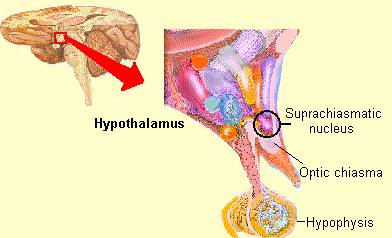Tomorrow, at least in California and a lot of other places shown in blue, we will move our clocks back an hour. Daylight savings was introduced in the United States as an energy-saving method.

This change is easier for people than the Spring change, usually in April, in which we move our clocks ahead. This “phase advance” is equivalent to the jet lag we experience flying East. If a Los Angeles native who usually sleeps from 10 to 6 travels to New York, he/she must now go to sleep at 7 and wake up at 3. Yuck. In contrast, the New Yorker flying to LA only has to stay up until 1 a.m., and then can sleep in until 9 a.m. Most people would have relatively less difficulty with that scenario.
Coren (1996) reported that in Canada, the Fall shift in time is associated with a 7% decrease in traffic accidents, while the Spring shift is correlated with a 7% increase in accidents [1]. This is quite dramatic, given the fact that the time shift takes place on Sunday morning, and Coren’s traffic data are for the following Mondays.
The disruption we feel in both daylight savings shifts and jet lag include fatigue, irritability, and sleepiness. We can thank our suprachiasmatic nucleus (SCN; located in the hypothalamus) for these feelings. Human beings run on a 25 hour clock, as opposed to our artificial 24 hour clock, and it is the job of the SCN to reset our internal clocks based on the perception of early morning light. However, other factors also influence our clocks, including eating and activity patterns. When the clocks no longer agree, we feel a bit disoriented. Fortunately, we usually adjust within a day or two.

I don’t know if understanding our reactions to changes in daylight saving time will make you feel any better, but at least we all know we should drive extra carefully tomorrow and Monday.


4 Comments
SaraViggianelli · November 4, 2007 at 8:57 pm
I wonder why we continue to have this fall daylight savings time? It was introduced during World War I when we needed to conserve fuel and energy to produce electricity. Right now energy efficiency is one of the top topics of debate in presidential campaigns. They are coming out with energy efficient light bulbs, cars, and everything else you can possibly think of. With this fall daylight savings time we lose an hour of daylight and thus an hour of natural energy. It doesn’t really seem to make sense, plus now experts are finding that it alters our suprachiasmatic nucleus which can make us irritable and sleepy. Now that studies are showing that the time changes affect the number of car accidents by 7% (either one way or another) maybe we should just get rid of it all together. It seems like it is more a hindrance than a help.
kbushman · November 6, 2007 at 4:03 pm
Personally, I wish we could have daylight savings time year round. Sure, an extra hour of sleep is always nice, but when it comes down to it, darkness at 5:00 is depressing. It feels like our days get cut in half. I love the sun and being outdoors, and getting out of class at 6 every night and it being pitch black discourages me to go out and do things like exercise because I feel like I just want to stay inside and be lazy. I wonder if there have been any studies done on comparing depression levels during DST and not during DST. I think that would be really interesting.
Dianawagen · November 7, 2007 at 9:51 am
I hate that we have to change its against my nature. Its kinda like how I want to live long yet stay young. We are always contridicting ourselves I want to sleep in but not have to go to bed late. I think we could do without the time change does it really make that big a difference. It seems to get dark so quick to quick and i miss my jogging trail.
Laura’s Psychology Blog » readings in psychology for 7 november 2011 · November 7, 2011 at 9:39 am
[…] Daylight Savings time… an older post of mine by timely! […]
Comments are closed.